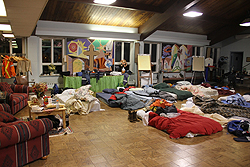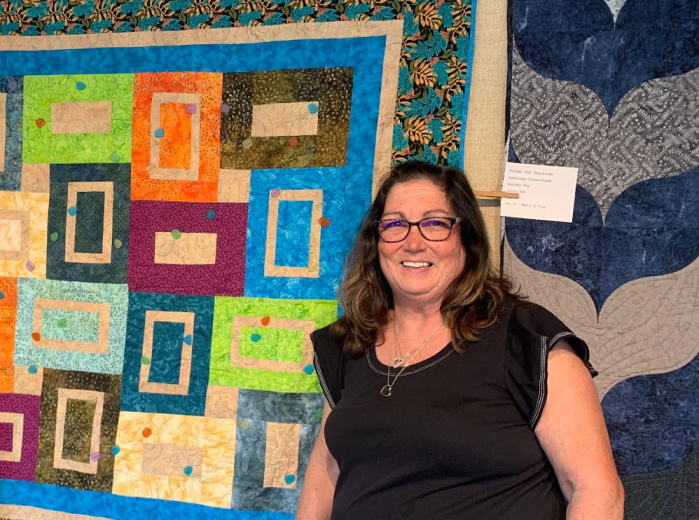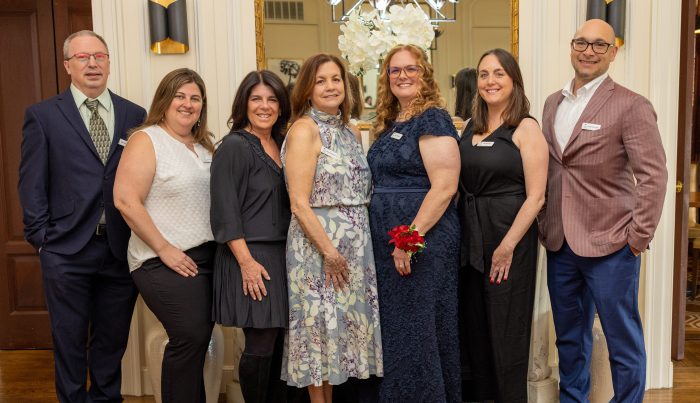First Presbyterian Church shelters Canadian crews
Long Islanders welcomed the crews from all over the United States and Canada who came to turn the Island’s lights back on. Working for LIPA, was an invasion of crews of men, with equipment and trucks and it took time to organize and as a result many of the crews were forced to sleep in their trucks out in the cold and get food on the run. Here in Oyster bay, Steve Wasilchuk spotted the men and set about organizing things to see that they would be cared for. The First Presbyterian Church and the Rev. Jeffrey Prey and his parishioners welcomed them. They invited 14 men to stay in their parish hall from Monday, Nov. 5 through Friday, Nov. 16.
On Election Day, Nov. 6 another team showed up saying they heard they were hosting people. Rev. Prey told them, while they could help them, it might be nicer for them if they asked another group to host them, and they went to Christ Church. There the Rev. Peter Casparian hosted 12 of them. “It only seemed fair to let them each have adequate space to live, bathe and sleep. I don’t know why LIPA couldn’t find lodgings for them instead of letting them sleep in their trucks, out in the cold,” he said.
The Rev. Prey explained what happened. He said, “Two crews of eight guys each arrived from Ontario, working for Veridian Power Co., and Westmore Electric Co. respectively, on Saturday, Nov. 3, and slept in their trucks. They were assigned to our area and worked on Sunday in Bayville and Mill Neck. They then went out to Ronkonkoma where they were housed in a tractor-trailer barracks. With so many out-of-state crews and limited power to hotels (not to mention their being filled with displaced families), LIPA was caught off guard in terms of lodging.
“One of our members, Steve Wasilchuk was working on his late mother’s house in Mill Neck Estates and ran across the crews. He felt we could do better for them, so he called me. I put out an email to everyone I could think of from our church asking for mattresses and bedding. The members came through in a big way, and we were able to house everyone.
“Steve continued to work on other logistics, and arranged for them to shower at the Atlantic Steamer Company firehouse. Our members brought in baked goods for them to snack on, provided DVDs for them to watch, and recommended restaurants in town.

“Fortunately, Oyster Bay had power back on fairly quickly, so we were in a position to help out like this. As I understand it, many other crews were housed at other churches, schools, fire houses, and Boys & Girls Clubs. As one person put it – it was nice to see people helping people who had come to help people.
“Our Canadian crews were great — very appreciative of the hospitality — while we were busy telling them it was we who were grateful for them coming down. They were apparently quite good at figuring out how to do the hard jobs of hanging transformers deep in the woods where the trucks could go. Their National Grid guide said they did excellent work.
“We were glad to be able to do a little bit in terms of opening our church to them so they could stay near where they were working, and have at least a minimal level of comfort after a long day out bringing us back to normal,” said Mr. Prey.
One crew had work they needed to do in Canada and the other crew had taken care of emergency work for LIPA and were waiting around for the next job. Before that there was no stopping and since the need had diminished they decided it was time to go home and they did so on Friday, Nov. 16. They didn’t need to get back for Thanksgiving Day, since in Canada they celebrate it in October.”
A Canadian Thank You
The Canadians were appreciative of the help and sent an email to Mr. Prey thanking he and the parishioners. The letter said, “Just wanted to let you know we made it back home around 4 p.m. last night. After a quick picture with our local paper and mayor, we were back with our families shortly before 5 p.m.
“With me following my GPS and the line trucks not able to travel down certain roads, we did encounter a bit of a challenge getting off the Island but all went well after that.
“On behalf of the boys and myself, I again would like to say a big thank-you for your warm and caring hospitality. We are definitely better people for spending the time with you and your church family. You all made us feel so welcome and a part of something real special. (I am not sure if we are going to get Pig back to church but I know he knows the great fellowship feeling now),” wrote Joe.
He invited the Preys to visit him and added a comment for artist Barbara Prey, “There is lots of great painting in the Thousand Island area.”
Personal Experiences
Everyone’s experience during superstorm Sandy was a little different. Oyster Bay resident Dick Longworth had a harrowing experience. A LIPA crew visited he and his neighbors along McCouns Road on Wednesday, Nov. 4 at about noon. The crew was familiar with the area because they had been there after Hurricane Irene, Mr. Longworth said. “A house in Fieldstone was cut in half by a giant tree that fell, so these guys had helped at that time and were repeats to the area.”
Although he remembered LIPA doing a good job then, they appeared lackluster for Hurricane Sandy. He said what appeared to be two retired LIPA workers had come to assess the damage, on Nov. 4; they told him that they would be up and running the next day, that it was a simple repair.
Mr. Longworth said, “It was easy, they just had to get up to do it. Five houses needed one fuse and it took a week for them to come back and for someone to get up in a bucket truck and put in a fuse which took five minutes and seven days.”
He said, eight days after the men were there, trucks from out of town arrived to do the work. He credited a lack of communication for the delay.
Ian McCurdy said Florence Park had a few problems in that three trees came down. “Another tree just leaned on a house, until they took it down.” A similar thing happened in East Norwich with a tree just resting on the side and roof of a house until it was taken down by the home owner.
The community is going to be telling stories about Hurricane Sandy for many years, and many years after that. It was, what is called a 100-year storm, so hopefully there will be a long pause between events.































